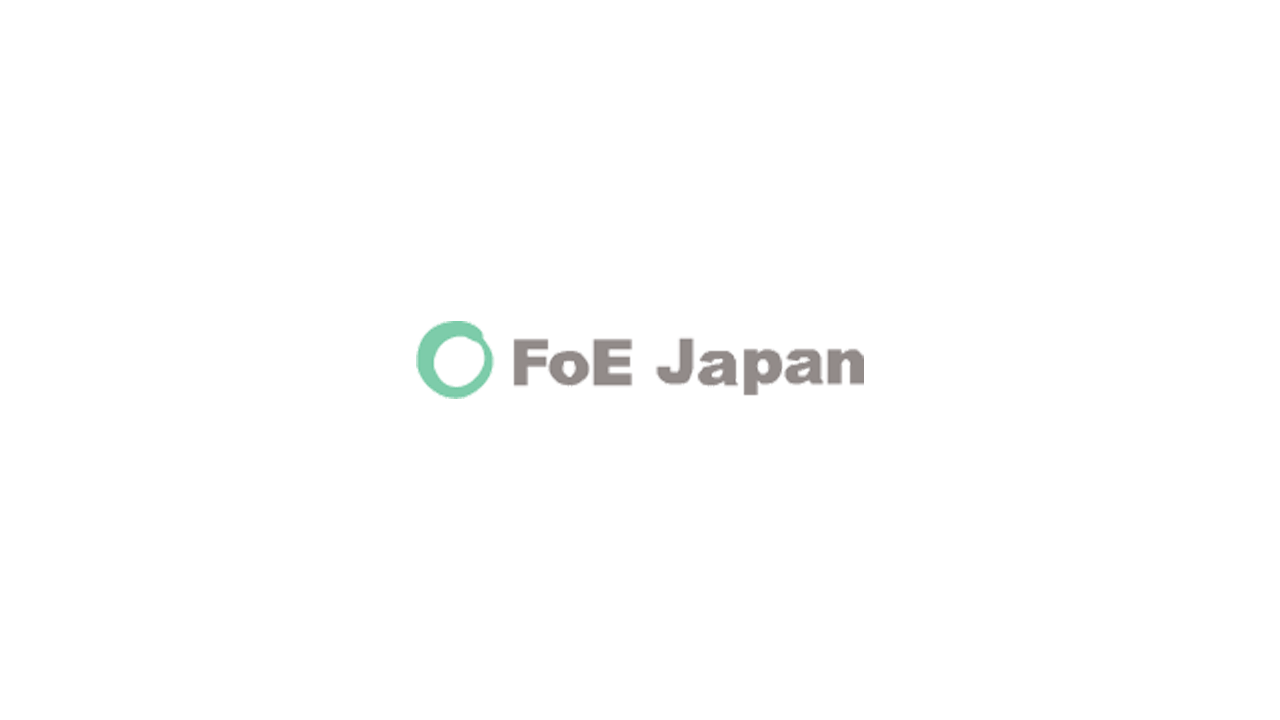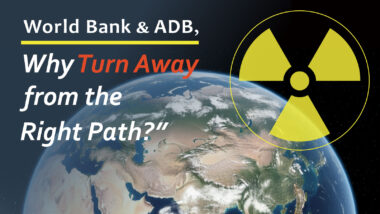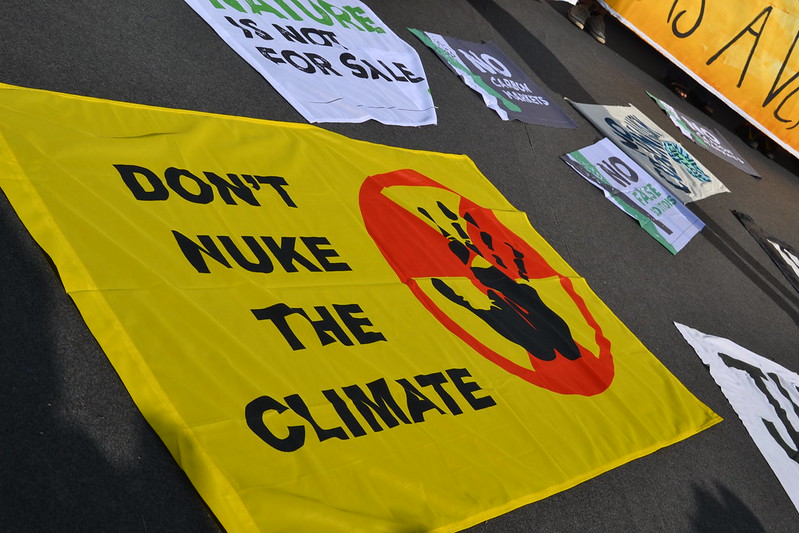81 Organizations Worldwide Protest ADB’s Lifting of Nuclear Financing Ban- "Long-term risks and costs imposed on people in developing countries"
On November 24, the Asia Development Bank (ADB) approved a revised energy policy removing its previous “no financing for nuclear power” clause and allowing support for nuclear energy.
In response, 81 organizations worldwide issued a statement protesting that nuclear support benefits a small number of corporations while imposing long-term risks and financial burdens on people in developing countries, delaying the transition to sustainable energy.
Key concerns highlighted in the statement include:
- High-cost, high-risk nuclear technologies
ADB cites technological progress in small modular reactors (SMRs) as a reason for the policy change. However, SMRs have high costs per megawatt of capacity and often use highly enriched uranium fuel. This makes them economically unviable and increases nuclear proliferation risks. - Insufficient risk assessment and disregard for civil society input
Many NGOs have raised the following concerns, but ADB has provided no meaningful responses:- Risks of terrorism and military attacks
- Widespread environmental contamination and socio-economic disruption in the event of an accident
- Release of radioactive materials throughout the life cycle and impacts on indigenous peoples
- Unresolved issues of final disposal of radioactive waste
- Delays in the deployment of renewable energy, undermining climate crisis responses
- Increased economic burdens and debt for developing countries
- Ignoring the voices of Fukushima nuclear disaster victims
Ms. Saki Okawara, Secretary-General of “Hidanren,” an organization representing victims of the Fukushima Daiichi nuclear disaster, requested in a meeting with ADB that a public hearing be held in Fukushima to hear directly from those affected. ADB ignored this request and did not include it in the consultation summary published on November 3. - Insufficient policy change process
The removal of the previous “no financing for nuclear power” clause was announced in August 2025, and the Board approved the change in just three months. This period is far too short for such a significant policy shift, and meaningful civil society consultation was not conducted.
The full statement can be viewed as follows.
Joint Statement: Protest Against the Asian Development Bank’s (ADB) Decision to Lift the Ban on Nuclear Power Support
At its Board of Directors meeting held on 24 November, the Asian Development Bank (ADB) approved a revision to its energy policy that removes the previous provision stating that the Bank “will not finance nuclear power,” thereby opening the door to potential support for nuclear projects.
We strongly protest this decision, as support for nuclear power, while benefiting large corporations in the nuclear industry, imposes significant burdens and risks—including insoluble nuclear waste—on people in developing countries in Asia and delays their transition to a truly sustainable energy system.
In its Energy Policy 2021, ADB stated that it “will not finance investments in nuclear power given the many barriers to its deployment, including risks related to nuclear proliferation, waste management and safety issues, and very high investment costs relative to ADB’s resources.” None of these barriers have changed.
As a reason for its policy shift, ADB cites “technological advancements,” specifically small modular reactors (SMRs). However, SMRs have higher costs per megawatt of installed capacity and are often projected to use fuel enriched to higher levels of uranium concentration. We are concerned that SMRs lack economic viability and increase proliferation risks.
In addition, many NGOs raised the following concerns, to which ADB failed to provide any meaningful response:
- Rising risks of terrorism and military attacks
- Long-term and widespread environmental contamination and severe social and economic disruption in the event of an accident
- Even without accidents, radioactive materials are released into the environment at every stage of the nuclear life cycle; uranium mining causes land dispossession and environmental damage to indigenous peoples
- The disposal of radioactive waste remains essentially unsolvable, and even most advanced economies have yet to determine a final disposal site
- Counterterrorism measures lead to the withholding of critical information, preventing residents and other stakeholders from accessing information essential for their safety
- Delays in the deployment of renewable energy, undermining the ability to respond to the climate crisis
- SMRs still require enormous financial resources
- Severe long-term risks and massive economic burdens imposed on current and future generations in developing countries
- It will continue to drain public funds for debt repayment, while also posing seismic and contamination risks.
Ms. Saki Okawara, Secretary-General of “Hidanren,” an organization representing victims of the Fukushima Daiichi nuclear disaster, and herself a resident of Fukushima Prefecture, stated in a meeting with ADB: “We urge you to face the devastating harm caused by the Fukushima nuclear disaster. Please hold a public hearing in Fukushima to hear directly from those affected.” She later submitted this request in writing. Not only did ADB disregard her statement, but it also failed to include it in the official consultation summary document released on November 3. Many concerns raised by NGOs were likewise excluded from the document.
ADB initiated the current energy policy review as a minor update. It was only in August of this year that the public first learned that the Bank intended to delete the long-standing provision that it would not finance nuclear power. The proposal was brought to the Board in just about three months thereafter. This is an excessively short timeframe for such a major policy shift, and the consultations carried out were only superficial. Such a process betrays the trust that civil society places in ADB.
We reiterate our opposition to ADB’s decision to open the door to nuclear power support. We will continue to raise our voices and work in solidarity with civil society organizations and communities around the world—including those who may be directly affected by future nuclear power construction.
Signatories*
*As of November 26, the statement has been endorsed by 88 organizations (81 at the time of release)
- 11 March Movement, Belgium
- 350.org Japan, Japan
- Action against nuclear plant (AMA), Norway
- Active Help Organization (AHO), Pakistan
- Aktionsbündnis “Stop Westcastor " Jülich, Germany
- Arbeitskreis gegen Atomanlagen Frankfurt am Main, Germany
- Asia Pacific Network of Environmental Defenders, Asia Pacific
- Association For Promotion Sustainable Development, India
- Association Noé21, Switzerland
- Australian Conservation Foundation, Australia
- BCSUW (Belgian Coalition Stop Uranium Weapons), Belgium
- Biodiversity Conservation Center, Russia
- Center for Wellbeing & Environmental Economics, India
- Centre for Financial Accountability, India
- Centre for Human Rights and Development, Mongolia
- Chutka Parmanu Virodhi Sangarsh Samiti, India
- Citizen’s Eyes on Nuclear Regulation, Japan
- Citizens’ Commission on Nuclear Energy (CCNE), Japan
- Citizens’ Nuclear Information Center, Japan
- Climate Express, Belgium
- Coalition for Nuclear Disarmament and Peace (CNDP), India
- Consumers Association of Penang (CAP), Malaysia
- Ecodefense, Russia
- Folkkampanjen mot kärnkraft-kärnvapen, Sundsvall, Sweden
- For Nature, Russia
- Forum for Protection of Public Interest, Nepal
- Friends of the Earth Adelaide, Australia
- Friends of the Earth Asia Pacific, Asia Pacific
- Friends of the Earth Australia, Australia
- Friends of the Earth Canada, Canada
- Friends of the Earth, India, India
- Friends of the Earth Japan, Japan
- GAiA Asia Pacific, Philippines
- Gender Action, United States
- Green Action, Japan
- Growthwatch, India
- Grup de Científics i Tècnics per un Futur No Nuclear, Catalunya
- Indigenous Women Legal Awareness Group (INWOLAG), Nepal
- Initiative 3 Rosen, Germany
- Institute for Sustainable Energy Policies, Japan
- Jamaa Resource Initiatives,, Kenya
- Japan Center for a Sustainable Environment and Society (JACSES), Japan
- Jubilee Australia Research Centre, Australia
- KFEM Friends of Earth KOREA, Korea
- Korea Center for Sustainable Development, Korea
- Ladlad Caraga Inc., Philippines
- Les Amis de la terre France, France
- Les Amis de la Terre-Togo, Togo
- Leuvense Vredesbeweging, Belgium
- Lok Shakti Abhiyan, India
- Manhattan Project for a Nuclear-Free World, United States and Japan
- Manthan Adhyayan Kendra, India
- MAUSAM (Movement for Advancing Understanding of Sustainability And Mutuality), India
- Medical Association for Prevention of War, Australia
- Miljöpartiet de gröna The Green Party, Sweden
- Milkas, Swedish Environment Movements Nuclear Waste Secretariat, Sweden
- Movement for Nationalism and Democracy, Philippines
- Movement for Women’s Rights, India
- National Alliance of People’s Movements, India
- No Nukes Asia Forum Japan, Japan
- Nei til Atomvåpen Oslo, Norway
- NOAH – Friends of the Earth Denmark, Denmark
- Nucléaire Stop Kernenergie, Belgium
- Nuclear Information and Resource Service, United States
- Nuclear/Coal-Free Bataan Movement-Philippines, Philippines
- Oyu Tolgoi Watch, Mongolia
- Paryavaran Suraksha Samiti, India
- Peace Boat, Japan
- Pennirima Iyakkam, India
- People’s Union for Civil Liberties, India
- Rivers without Boundaries, Mongolia
- Sahabat Alam Malaysia (SAM) – Friends of the Earth Malaysia, Malaysia
- San Francisco Bay Physicians for Social Responsibility, United States
- Sortir du nucléaire 72, France
- Stroom naar de Toekomst Limburg, Netherlands
- Taiwan Environment Protection Union, Taiwan
- TerraBiome, United States
- The Liaison Committee for Organizations of Victims of the Nuclear Disaster (Hidanren), Japan
- The People’s Campaign Against Nuclear Power and Nuclear Weapons, Sweden
- VAKS, Belgium
- Urgewald, Germany
- WALHI (Wahana Lingkungan Hidup Indonesia), Indonesia
- Washington Butterfly for Hope, United States
- Women Against Nuclear Power – Finland, Finland
- Women for Peace, Sweden, Sweden
- Women for Peace, Finland
- Young Bataeños for Environmental Advocacy Network, Philippines
- Za Zemiata/FoE Bulgaria, Bulgaria


